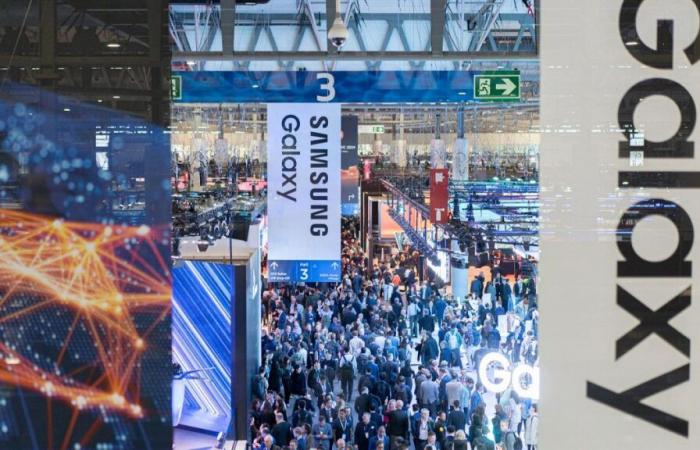
Euronews Next reviews some of the technologies presented this year to discover the advances or flaws that will be remembered in 2024.
ADVERTISEMENT
From artificial intelligence (AI) in the Olympics to some of the first test flights (and failures) of air taxi companies, 2024 has been a memorable year in technology.
Euronews Next had a front-row seat to discover cutting-edge innovations in all these areas at the biggest technology events of the year.
We present to you some of the best technological innovations of the year.
A big year for technology in sports
The Paris 2024 Olympic Games were marked by technological innovations such as AI on and off the field.
From an AI chatbot that protects athletes from cybercrime, to an AI-generated 360-degree replay of an athlete's performance, to an AI-assisted platform to monitor energy consumption , the Paris Games deployed new technologies in force.
The International Olympic Committee (IOC) has even launched technology to determine future Olympians: a booth that analyzes a user's strengths and weaknesses to determine their performance in 12 sports, such as soccer, running and table tennis.
New technologies were also used behind the scenes at the Games, including the controversial use of Cityvision, AI software that detects abandoned objects and crowd movements fromvideos of surveillance.
Brian Gumbel, president of Dataminr, which specializes in AI event monitoring, wrote in an article inopinion for Forbes that the technological advances made in threat detection and sports during the Paris Games “will serve as a model for future global events”, such as the upcoming 2026 Winter Olympics in Milan and Cortina d'Ampezzo and the 2028 Summer Olympics in Los Angeles.
AI is entering cars
Outside of the Olympics, AI has been integrated into all kinds of consumer technology this year.
Euronews Next was present at the Consumer Electronics Show (CES) in January when Volkswagen announced that two of its cars, the ID.7 electric sedan and the Golf GTI, would use ChatGPT as part of their in-car voice assistant.
In Volkswagen's model, drivers can ask the car to turn on the air conditioning, ask it how to entertain noisy children in the back seat or find the best place to eat butter chicken after a day's work.
Other companies like Audi et Mercedes-Benz(Germany), Peugeot(France) and Skoda (Czech Republic) have also added the ChatGPT voice assistant to their cars.
Throughout the year, we've seen more innovative ways to integrate AI into the driving experience.
Chinese automakers have invaded the Paris auto show with some of the first uses of AI behind the wheel. Most exciting for car enthusiasts was XPeng's P7+, described as the world's first “AI-defined” vehicle, which learns from the driver's preferences on the road and makes autonomous decisions to become a mobile butler .
Another model was Stellantis' Leapmotor B10, a crossover SUV that uses in-house software that will offer “advanced driver assistance”, a digital cockpit and intelligent driving.
The rise and failure of air taxis
2024 was supposed to be the year of air taxis, but the models seen by our Euronews Next team have not taken off as promised.
One company, Germany's Volocopter, told Vivatech in Paris that it had begun test flights of its electric flying taxi ahead of the 2024 Paris Olympics. If everything had gone according to plan, Volocopter would have launched its two-seater electric plane, the VoloCity, to transport passengers during the Games.
Instead, the company failed to borrow 100 million euros from the German government to get its taxis off the ground for good, which could mean manufacturing could be moved to China, according to the BBC.
In the meantime, other air taxi companies have presented their technology at various trade fairs, such as Hyundai's four-passenger battery vehicle at CES or Joby's air taxi, which was presented for the first time at the Farnborough Airshow in London.
Joby's craft is the closest to taking off in Europe with the fall of Volocopter, as the UK licensed the company earlier this year and is expected to begin commercial operations in 2025.
Tesla's Cybercab, unveiled at an event in California in October, is another robotaxi that has made waves this year. This model lacks a steering wheel and pedals and relies on cameras and artificial intelligence for navigation.
The taxi should cost less than $30,000 (27,000 euros) when it goes on sale in 2026.
Smartphones and smart glasses
2024 is also the year when consumers were able to discover innovations regarding smartphones and smart glasses of the future.
Meta made a splash at its annual Connect conference by launching Orion augmented reality glasses, capable of projecting digital representations of people and communications into the real world.
The glasses allow users to send a signal from their brain to the device using a “wrist-based neural interface” that translates nerve signals into digital commands.
The social media giant also updated its Ray-Ban sunglasses with artificial intelligence features, such as reminders and live translation.
But everything has not been rosy for Meta glasses. The company faced backlash after two Harvard students found a way to rig their Ray-Ban glasses to perform facial recognition in public places.
Our team saw new “foldable smartphones” at the Mobile World Congress in Barcelona.
Phones from Motorola and Lenovo can fold around the wrist or stand upright without a stand so users can “stay connected on the go,” according to a company press release.
The screens of the phones of the future are also more durable, like Samsung's foldable OLED displays on its phones at CES.
These displays can withstand extreme temperatures of -20 to 60 degrees Celsius, basketballs bouncing off their panels and can withstand “military standards”, Samsung said.
Euronews Next also saw Skyphone, a rugged satellite phone that can survive under a meter of water for 10 minutes. It also allows you to stay connected at sea, in the desert or in the mountains, because it does not rely on terrestrial networks for its signal.





